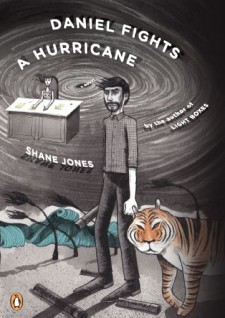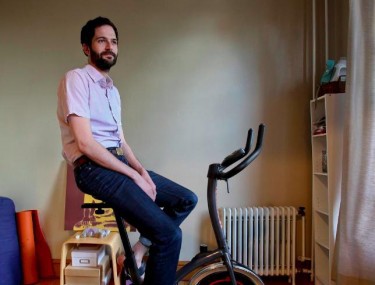How Shane Jones Fought Second Novel Syndrome

Shane Jones’ new novel, Daniel Fights a Hurricane, was published last week by Penguin. Like his first novel — Light Boxes, in which a town bands together to fight the month of February — Daniel Fights a Hurricane centers on a force of nature. The hurricane takes many shapes, including a mob of angry children, a monster with sharp teeth, and the madness that may or may not be filling Daniel’s head with visions. The book is filled with surreal, hallucinogenic imagery ranging from the terrifying to the hilarious — there are “banana bombs,” rotten bananas thrown like grenades — that work to create a sinister, modern fairy tale, but one written for the demented adult who lives in all of us.
I sat down with Shane — a former Publishing School guest — to talk about the book and get some perspective on what it’s like to publish a second novel.
When and why did you start thinking about using a hurricane as central theme of a book?
I started with the Daniel storyline and a pipeline being built to the ocean. Then I think there was a natural angling towards getting tension into the story and the hurricane idea came in. I was also looking at a lot of Hurricane Katrina footage, and was struck by how devastating and surreal that event was.
I know you live in Albany, New York. Did you see any of the flooding upstate last summer?
I did, but the book was way past finished. I wasn’t in any flooding, but heard plenty of stories about it from friends and people I knew.
So the book combines different landscapes, both physical and mental?
Yes. I thought a lot about New Orleans while writing the book and also just the wilderness of upstate New York. The combination of those two worlds, I think, is really odd and beautiful. Lots of light! There are numerous forest settings, which is what I was raised in. I was a scummy little kid who played in streams and in the woods constantly. As far as defining the hurricane, there are many ways to think about it. Ultimately, it’s about fear and chaos and how we can’t control things. They are just going to happen. Daniel is going to go deeper into his world and the hurricane is just going to come.
Structurally, the book switches between three perspectives: Daniel/first person, Daniel/third person, and Karen (Daniel’s ex-wife), who’s trying to find him when he leaves for the woods. How tough was it to balance these different perspectives?
The original draft of the book was almost all Daniel. It was insane and, to most readers, didn’t make much sense beyond a fantasy novel. Karen was in the background; she didn’t have a voice. Through edits she came out more and more, and the energy of the novel is created between the back-and-forth action of the sections. There’s a certain “seesaw” thing that goes on and the story lines play off each other and also overlap and intersect. The idea was to create a structure of swirling chaos, like a hurricane. The real and unreal, both Karen and Daniel, and the hurricane, all get mixed together.

In terms of the process from going to first draft to finished book, who reads and helps shape your work?
This was slightly different from my previous book. With Light Boxes, I had dozens of people read it. Adam Robinson at Publishing Genius Press was a huge influence. With Daniel, I kept it to myself more. I had only a few readers. I wanted it to feel a bit looser, messier, crazier. My agent helped a lot. My editor at Penguin didn’t change a single sentence I wrote, but she did want more of the Karen story line. She wanted more structure. Which, in the end, I think, made it a better book.
Reading Daniel, I felt like I was in your head more and that you were wrestling with some pretty big-ticket items, for example your sanity and… banana bombs.
Ha! The banana bombs were really fun to write and I’m proud of them. Also, cookie pocket. And yeah, Daniel Fights a Hurricane is more intimate, personal, and sadder. Light Boxes has this communal, people-banding-together-to-fight-evil vibe going on. This is going to sound really pretentious and writer-like, but Daniel is a book closer to the bone. I think it hurts more and I like that.
Were there other differences between the first and second novel in terms of how you were handled by the publisher?
I think there were differences. I never thought Penguin would publish Light Boxes. I never pursued a major press. Things just happened, and I got really lucky. With this book, I knew Penguin was going to read it and that was in the back of my head. That was one big difference. This book is more difficult than Light Boxes, I think. Light Boxes really plays up the myth/fantasy/magic theme. It’s a single contained world, until the ending. But it’s very clear. With Daniel, nothing is too clear. Reality, imagination, perspective, it’s all mixed. The sentences and imagery and set pieces are “out there.” I just let my imagination go and didn’t hold back to one way of thinking. The more I think about Daniel and hear what people think, the odder I think the book is.
What happened with Spike Jonze, and is a movie version of Light Boxes still in the works?
Spike Jonze will not be making Light Boxes into a movie. Right now, Ellen Frances, a filmmaker, has the option. Development is slow, but these types of things are crazy. A friend who is an actor on a television show once told me that making a movie is like playing Jenga in a wind tunnel. I think that’s true. Things can fall apart really fast and with the Spike Jonze thing they seemed to fall apart on the first move.
What kind of work do you do outside of writing books (assuming that doesn’t pay the bills)?
I work a day job, an office job, that pays my rent. Any money I get from books goes to paying off credit cards, buying more books, extra food, etc. It would be really hard for me to live on my book money. I mean, I could do it, but it would be very difficult. I think people see a major publisher and believe the author is set. Not the case for most. Not the case for me. And I’m okay with that. A day job balances me out. God, could you imagine what my books would be like if I was doing this all day? Scary.
Do you have an MFA?
No. I think teaching would be a lot of fun, but I can’t imagine any college inviting me to teach. I imagine I’ll just struggle in day jobs and write constantly because that’s what I love to do.
Related: Conversations With Sheila Heti (How Should a Person Be?) and Bill Wasik and Monica Murphy (Rabid: A Cultural History)
Matthew Gallaway is the author of The Metropolis Case: A Novel.
